The MuseFlow Blog
Discover:
News
When you’re choosing a new instrument to learn, the choices can be daunting. There are literally thousands of instruments out there to choose from, but there’s nothing quite like the piano. That’s why we at MuseFlow offer a fun and effective way to learn this popular and enduring instrument. But what is it about the piano that makes it so important?

It’s Musically Versatile
The piano is one of the most played instruments in the world. And a big part of that is its versatility across musical genres. The soothing classical music of Beethoven’s “Fur Elise.” The energetic jazz riffs of Duke Ellington’s “Take the ‘A’ Train.” The emotional modern pop bop of Chappell Roan’s “Pink Pony Club.” The piano is a core, foundational component of all of these musical genres, as well as many others (R&B, electronic, musical theater, film scores, Bossa Nova, and Tango to name a few). When you play each genre, you’re introduced to new tempos, melodies, and styles of play. The combinations and play styles are truly endless.
So when you’re learning the piano, you’re really opening yourself up to an entire world of music!
.avif)
It’s A Composer’s Best Friend
Going along with its versatility, the piano is the perfect instrument for composers. That’s because you can play up to 12 notes at once, and it can act as a compression for entire orchestras, bands, and choirs. You can play the bass and rhythm with the left hand and melody and harmony with the right, with both hands operating at different registers, roles, and meters at the same time.
The piano is actually considered a percussion instrument that creates percussive, rhythmic, and immediate sounds when you press a key and the internal hammer strikes a string, or set of strings. But the sound created can also be a sustained pitch, which allows for lyrical, harmonic, and legato sounds. There’s no other instrument on Earth that can do all of this!
Before the invention of the piano, music composers needed access to entire ensembles to write songs. But since its invention, those ensembles have become available at composers’ fingertips. This makes composition more affordable and accessible. If you want to compose a song, all you need to begin is your piano!
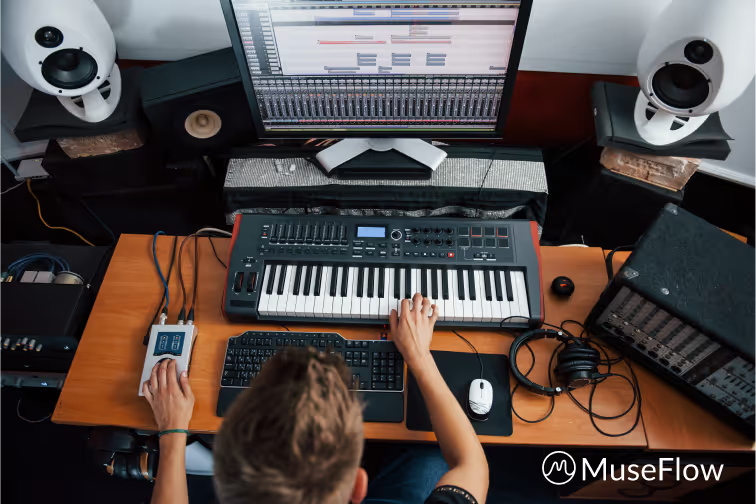
It’s Good for Your Brain
Learning the piano can be a fun way to challenge your brain. One study found that learning the piano can enhance your fine motor skills, since it’s an instrument that requires strong finger dexterity. The way your brain has to compute the sight reading and playing simultaneously can also activate two different parts of your brain at the same time.
It’s no surprise, then, that another study suggested that learning the piano can boost brain processing power. After just a few weeks of lessons, the participants’ ability to process multi-sensory information had improved. Amazingly enough, those participants also reported an enhanced mood, with less anxiety, stress, and depression!
So the next time you’re practicing the piano, you can know that you’re basically doing crunches with your brain.
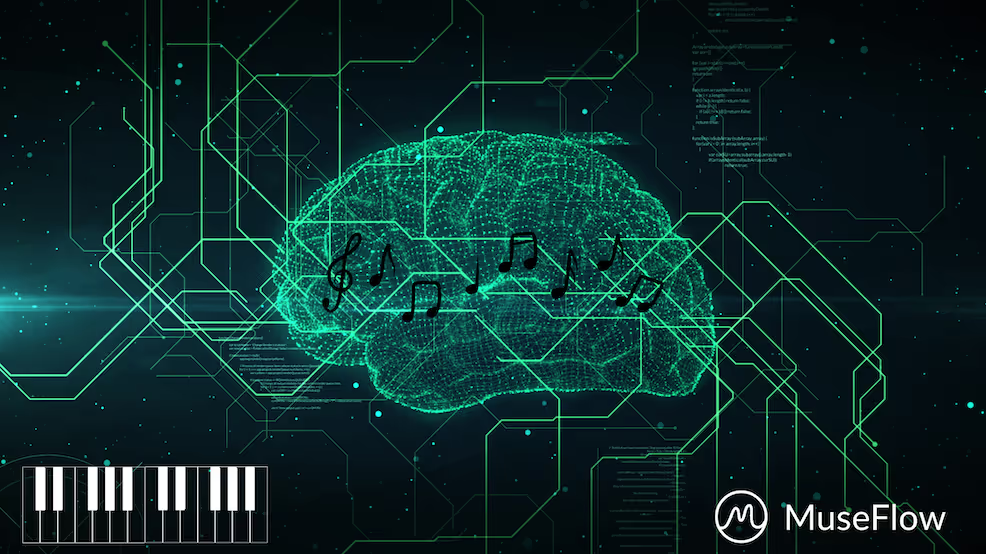
It’s Emotionally Resonant
The piano is powerful. A somber chord in a movie soundtrack can bring us to tears. A springy tune at a wedding reception can send everyone, including that one uncle who never dances, running to the dance floor. A new song can stop us in our tracks. A recognizable melody can immediately pull us back to the first time we heard it. There’s an emotional resonance that we get from the piano that’s hard to put into words. But we know it when we feel it.
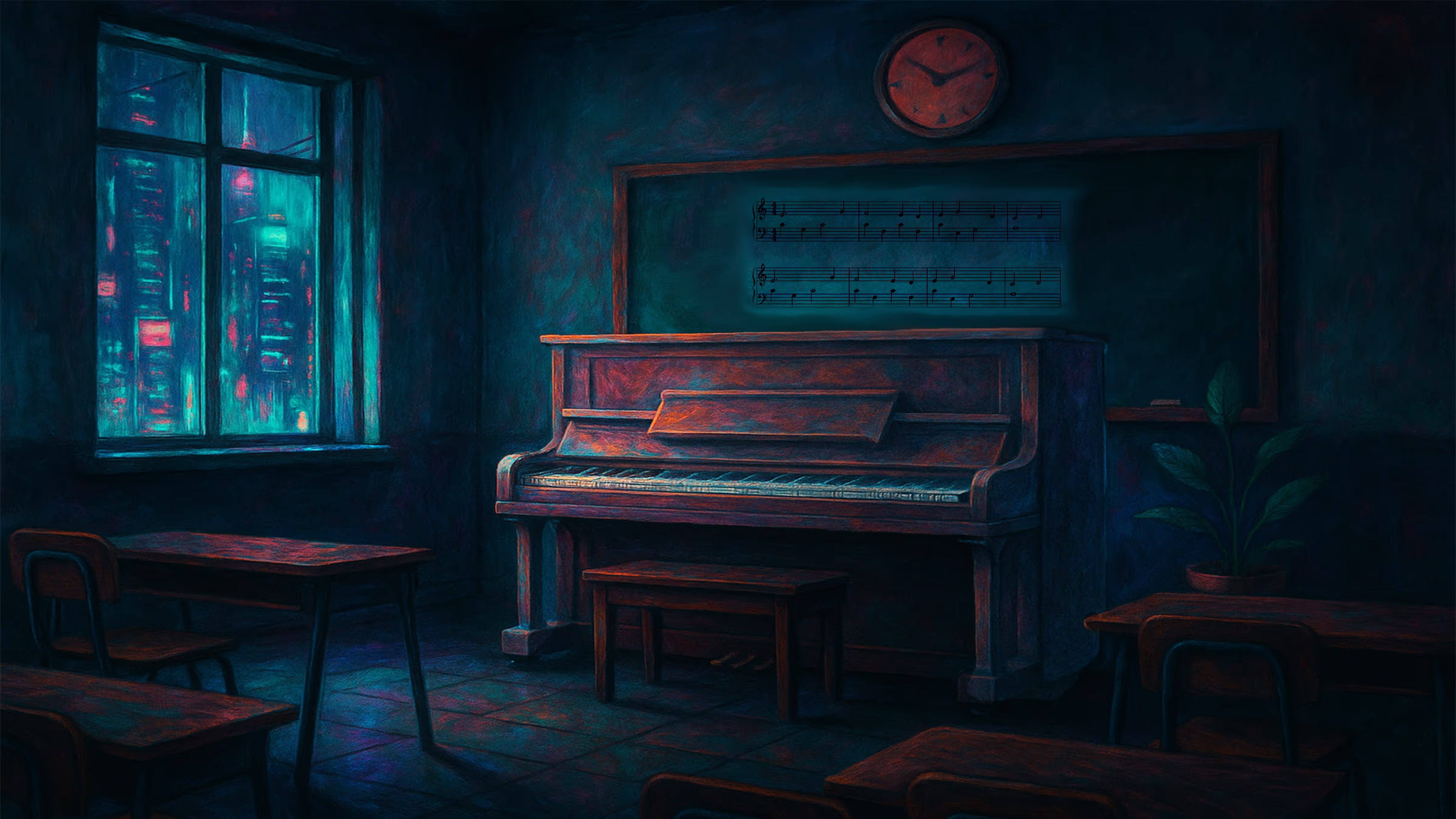
Conclusion
People have been playing this instrument since the 1700s. It’s been played for kings and queens. Its sound has filled massive stadiums of screaming fans as well as intimate living rooms with family and friends.
It’s an instrument unlike any other, able to stand in for just about any other instrument, even a full orchestra. You can play a limitless variety of music on those 88 keys. And since the piano doesn’t require size changes or “starter versions” like some other instruments, you can play a complex concerto on the same piano that you first learned “Ode to Joy” on.
The piano stands alone in its versatility, accessibility, and usefulness across musical genres. It’s a powerful and timeless instrument that has changed the worlds of music and composition forever. We’d say that makes it pretty darn important!

Why People Quit Learning Music
We here at MuseFlow know that there are as many different journeys to the piano bench as there are players - and just as many away from it, too. Below, we discuss the common reasons why people have trouble sticking with traditional music lessons and how the revolutionary app for learning piano MuseFlow challenges each one to help you learn to play, once and for all.
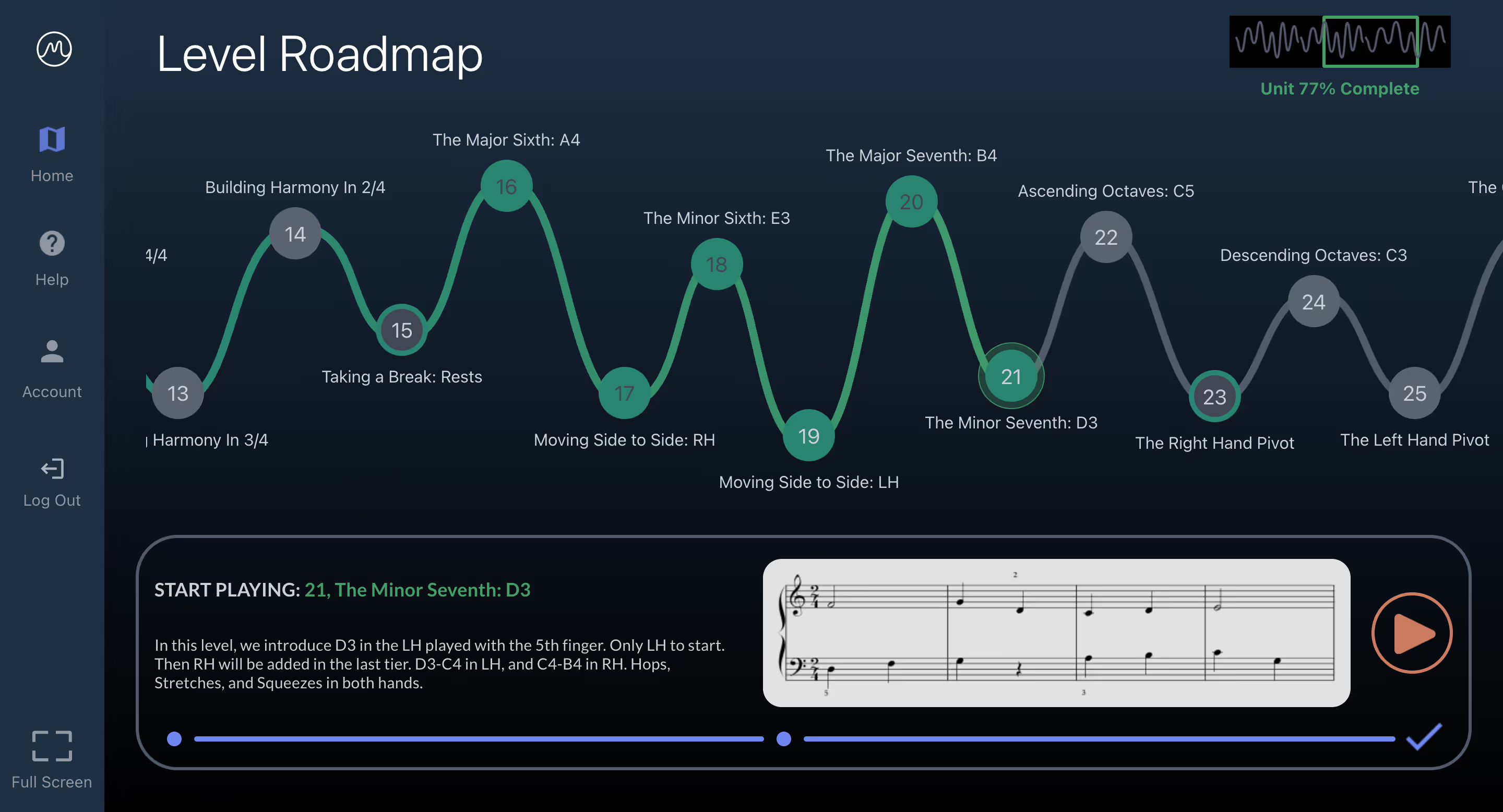
1. Boredom
THE PROBLEM:
Traditionally, music is taught by a model of rote repetition with limited sight reading development. In fact, many other music apps teach you using this method. While it is entirely possible to learn this way, it takes much longer and can lead to burnout from boredom - especially in fast, intelligent learners. This can also lead to poor retention, slowing progress.
THE SOLUTION:
MuseFlow’s ingenious gamified interface makes learning feel like play, introducing music that never repeats to keep your brain engaged. Our adaptive learning adjusts to your skill level, allowing you to get into a Flow State while learning, promoting deep understanding in the quickest, most fun way possible. Studies show that fun is one of the most important factors for sticking with learning music.
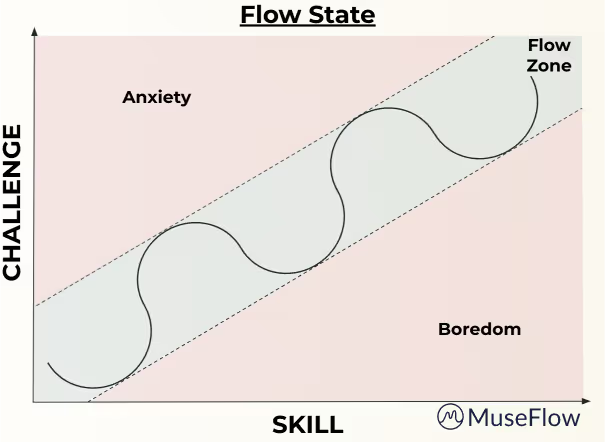
2. Socio-Economic Factors
THE PROBLEM:
The average music lesson in the United States in 2025 ranged from $280-$400 per month, not including access to music rooms throughout the week or purchasing books.
THE SOLUTION:
MuseFlow is a much more accessible piano learning option at $24.99 a month - including a free 14-day trial.

3. Shifting Priorities
THE PROBLEM:
Especially if you initially played as a child, shifting priorities as we get older splits our focus and our time. Many little virtuosos had to choose between music and other extracurriculars.
THE SOLUTION:
MuseFlow helps you learn to play piano in your own time, even if that’s only 15 minutes a day; in your own space, even if that’s the kitchen table. The MIDI integration allows for support of various keyboard sizes.
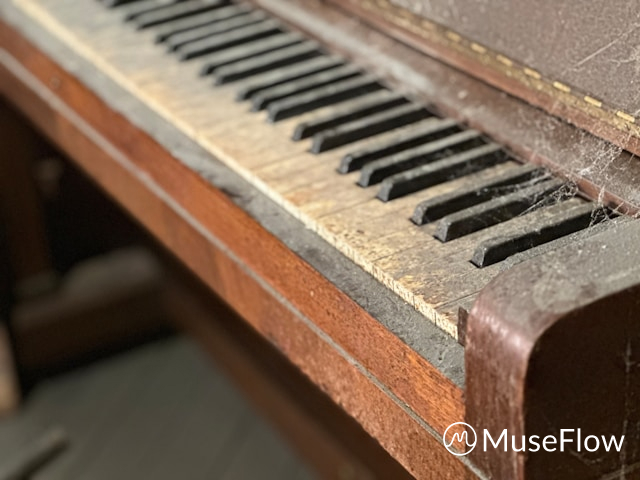
4. Environment
THE PROBLEM:
Anyone who has ever lived in an apartment, or with someone picking up the recorder, understands the limits of learning a new instrument in almost any home environment.
THE SOLUTION:
MuseFlow’s MIDI keyboard interface allows you to not only learn to play anywhere you can set up the app, but with a pair of headphones, you can play in any environment.
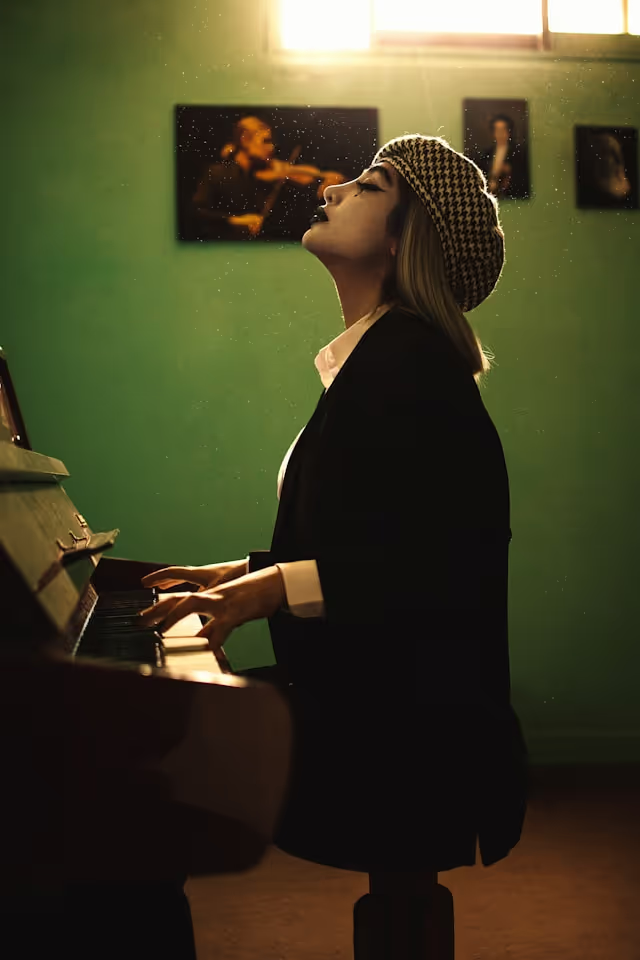
Lack of Feedback
THE PROBLEM:
When alone, it can be frustrating to practice repetitively without any indication whether you’re doing anything correctly or incorrectly. Especially when people are beginning to learn on their own, they can drop the practice due to this frustration. Even in classical piano training, with taking lessons once a week, practicing alone six days a week incorrectly reinforces bad habits.
THE SOLUTION:
MuseFlow provides instant, precise feedback to gently help you correct mistakes in real-time, and instant audio and visual confirmation when you get it right. This is especially useful for complete beginners and self-taught pianists, so you can build confidence and a solid foundation. Seeing the fruits of your labor and success as you go is likely to increase self-confidence and empower you to keep up with your practice.
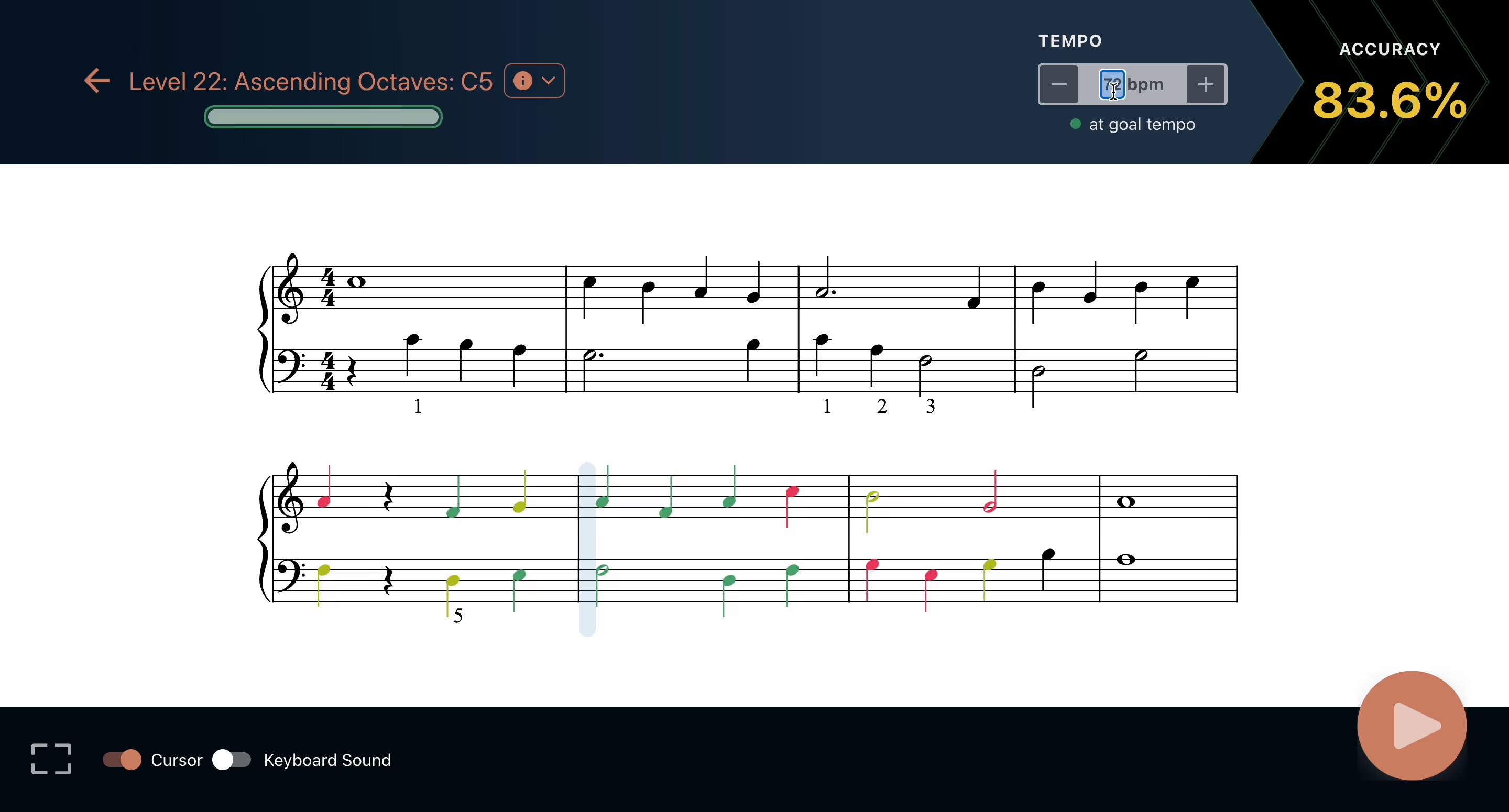
Time
THE PROBLEM:
I get it - you want to get right to playing your favorite songs ASAP! The traditional method of rote memorization of the basics definitely has its value, but it does put a damper on your Elton John dreams. Progress can feel like a slog through inefficient exercises through traditional exercises.
THE SOLUTION:
MuseFlow’s sight reading first approach teaches you to read your favorite music fluently; not just the ones you’ve memorized, so you can get started once you’ve mastered each lesson. MuseFlow’s adaptive structure also allows you to progress at your own pace.
Conclusion
MuseFlow empowers you, no matter where you are in your music learning journey, to reach your music goals by using revolutionary, research and experience backed design to help you overcome common pitfalls.

MuseFlow: The Real-Time Feedback Piano App Making Learning Fun Again
Here at MuseFlow, we're on a mission to make learning piano as fun and engaging as it is rewarding! One of the most powerful features of our app is its real-time feedback system. Yes you read correctly! If you've ever searched for a real-time feedback piano teacher, you know how important it is to get that instant response to your playing. It's the key to making progress and staying motivated.
For those looking for a tool that feels like an AI piano teacher, MuseFlow provides an experience that is so seamless and intuitive, it's like having a guide by your side at all times. But how exactly does this real-time feedback piano software make learning fun again? Here are five ways.
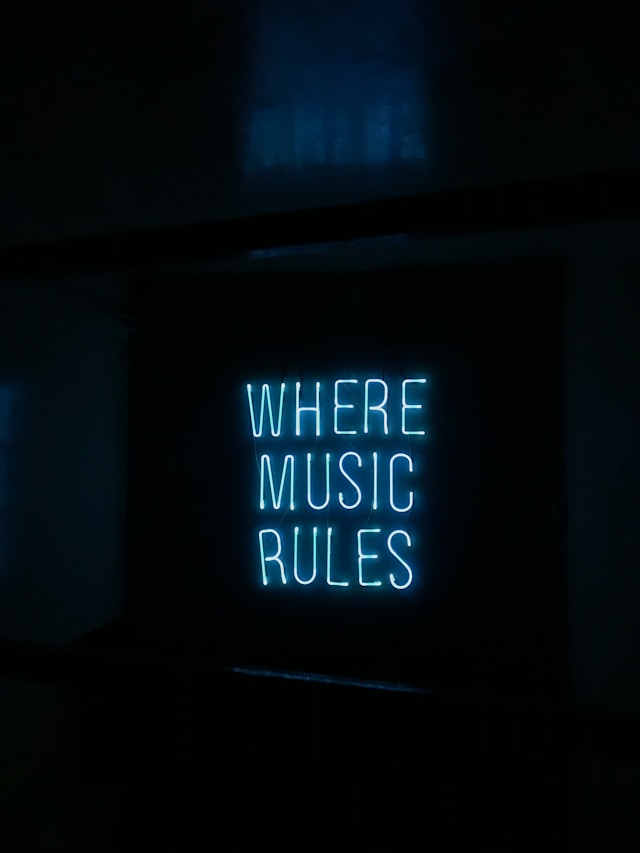
1. It Turns Practice into a Game
Let's be honest.. traditional piano practice can sometimes feel like a chore. The endless repetition of scales and exercises can quickly become monotonous. MuseFlow's real-time feedback transforms this experience by turning practice into a game. Every note you play is instantly registered and scored, giving you that satisfying feeling of accomplishment with every correct key press. This gamified approach is not just fun.. it's also incredibly effective. According to research, "gamification has been shown to increase student motivation and engagement in a variety of educational settings."
2. You Get Instant Gratification and Correction
There's nothing more frustrating than practicing a piece for weeks, only to find out you've been playing it wrong the whole time. With a real-time feedback piano app like MuseFlow, that's a problem of the past. You get immediate confirmation when you play a note correctly, and gentle correction when you don't. This instant loop of action and feedback is incredibly powerful. It helps you build good habits from the very beginning and gives you the confidence to tackle new challenges.
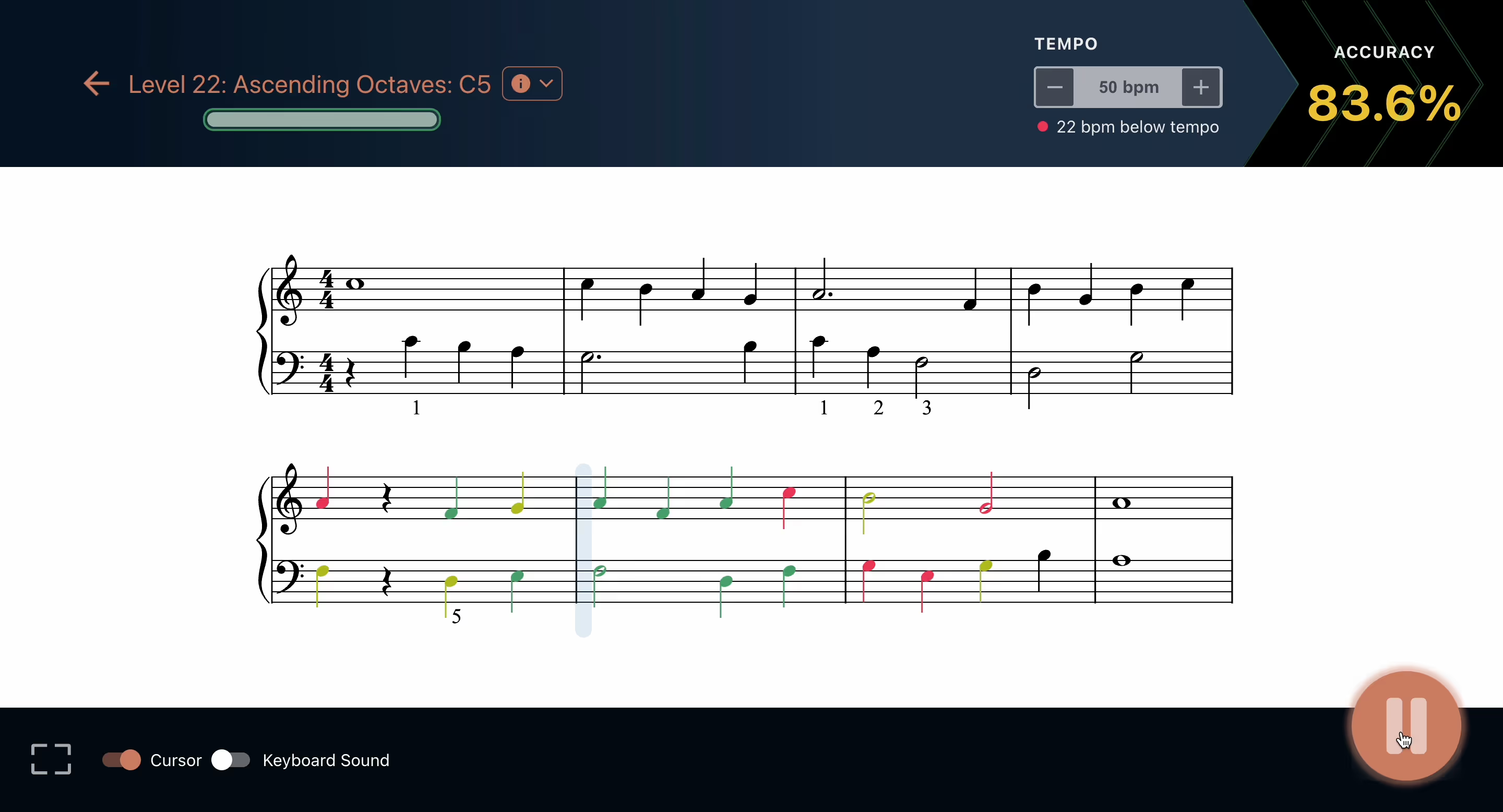
3. It Helps You Find Your "Flow State"
Have you ever been so absorbed in an activity that you lose all track of time? That's called a "Flow State," and it's the secret to truly enjoyable and effective practice. MuseFlow's real-time feedback is ingeniously designed to help you find this state. The app's adaptive technology adjusts the difficulty of the lessons to your skill level, ensuring you're always challenged but never overwhelmed. This perfect balance keeps you fully engaged and makes practice feel effortless and immersive.
4. You Build a Rock-Solid Foundation
While the fun and games are a huge part of the experience, MuseFlow is also a serious tool for building your musical skills. The app's uncompromising precision ensures that you're not just learning to play songs, but also mastering the fundamentals of music.. rhythm, timing, and note accuracy. This strong foundation is essential for long-term growth as a musician and will empower you to play with greater expression and confidence.
5. It Makes Learning a Personal Journey
Every learner is different, and a one-size-fits-all approach to teaching simply doesn't work. MuseFlow's real-time feedback system creates a truly personalized learning experience. The app understands your unique strengths and weaknesses and tailors its feedback and lesson plans accordingly. This elegant and transformative approach to learning ensures that you're always working on the skills that are most relevant to you, making your practice time as efficient and effective as possible.

In the end, the magic of a great real-time feedback piano app isn't just about the technology.. it's about the experience. It's about making learning fun, engaging, and deeply personal. And that's exactly what we've created with MuseFlow.
Ready to make your piano practice fun again? Try MuseFlow for free and experience the power of real-time feedback for yourself!!

Success Stories: How Students Mastered Piano with MuseFlow – A Piano Education App That Delivers Real Results
Looking for real piano learning success stories? MuseFlow isn’t just another piano app… it’s a revolutionary piano education with an app that helps students of all levels master piano with the help of an app that adapts to their progress. But don’t just take our word for it.. hear from real students who’ve transformed their piano skills using MuseFlow.

How MuseFlow Helps Students Succeed: A Few Piano App Testimonials
One of the biggest barriers to learning piano is simply knowing where to begin. Many aspiring musicians feel overwhelmed before they even press a key. Kyle put it best:
“If this was the norm for music education, I firmly believe the landscape would be radically different. Yes, people quit or don’t bother to learn because it can be frustrating, but I actually think the ambiguity of where to begin and how to effectively progress creates this analysis paralysis and discourages people from even trying.”
MuseFlow eliminates that uncertainty with a structured, step-by-step approach that guides learners through the process. For Megan, it provided what traditional lessons never did:
“When I took piano lessons as a child, I just learned how to play songs so I could pass them off. How I wish I had learned how to play notes.”
By shifting the focus to true note-reading and understanding, MuseFlow helps students build the foundational skills they wish they had from the start.
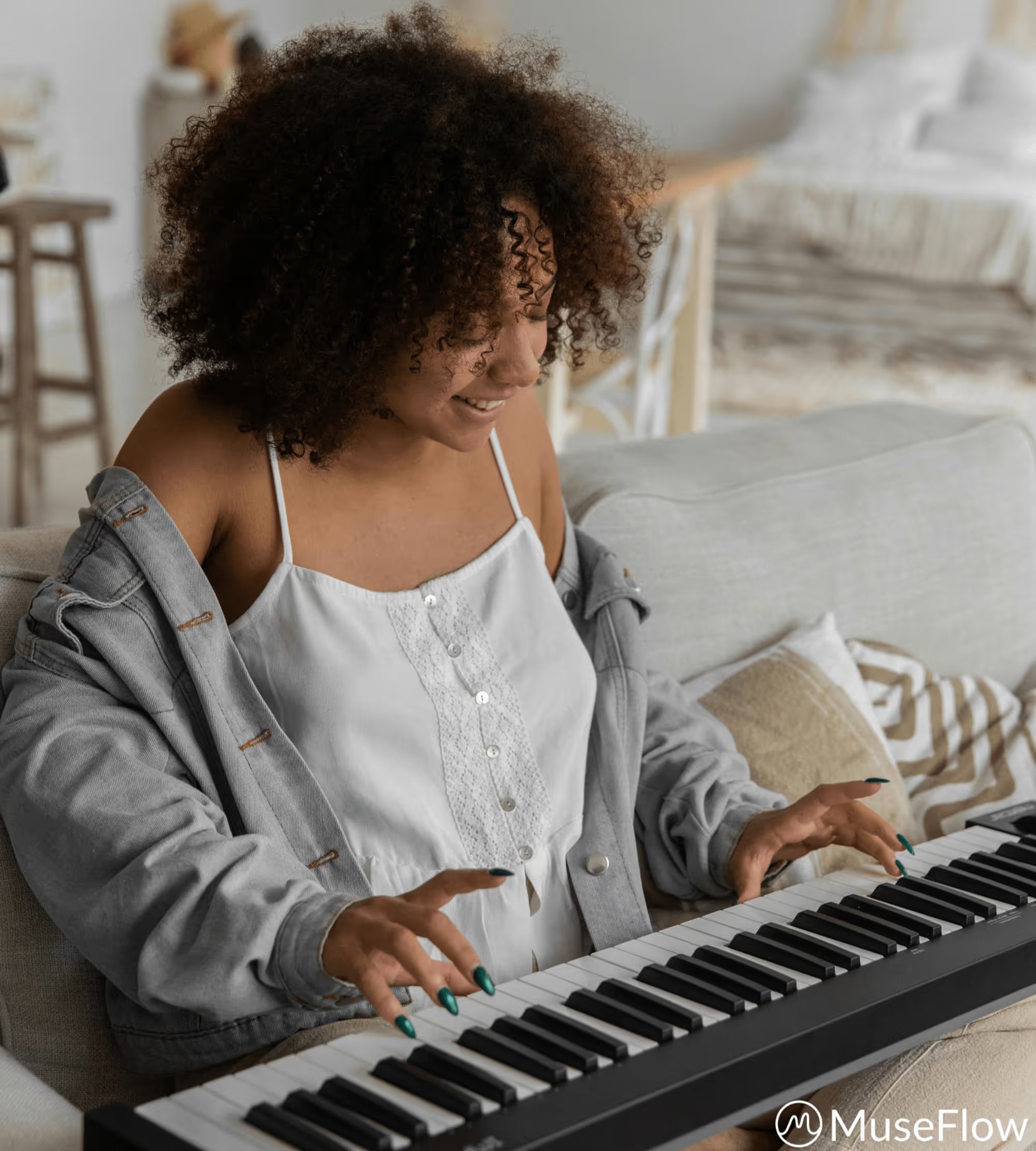
Overcoming Learning Hurdles: How to Master Piano with an App
For many musicians, sight reading has always been a struggle. But MuseFlow’s adaptive approach and real-time feedback have helped students break through their plateaus. Arjuna shared a major breakthrough:
“I don’t think I’ve ever been this good at reading music. It never made sense to me before.”
Katherine echoed that sentiment, noticing her progress with ease:
“Sight reading is getting really easy.”
The moment sight reading clicks is a powerful one. Sharon described how her brain and fingers started working in sync:
“My eyes would see the notes, and my fingers would just go to the right keys on their own, without my brain having to get involved much at all!”
That kind of instinctive playing is exactly what MuseFlow was designed to develop.
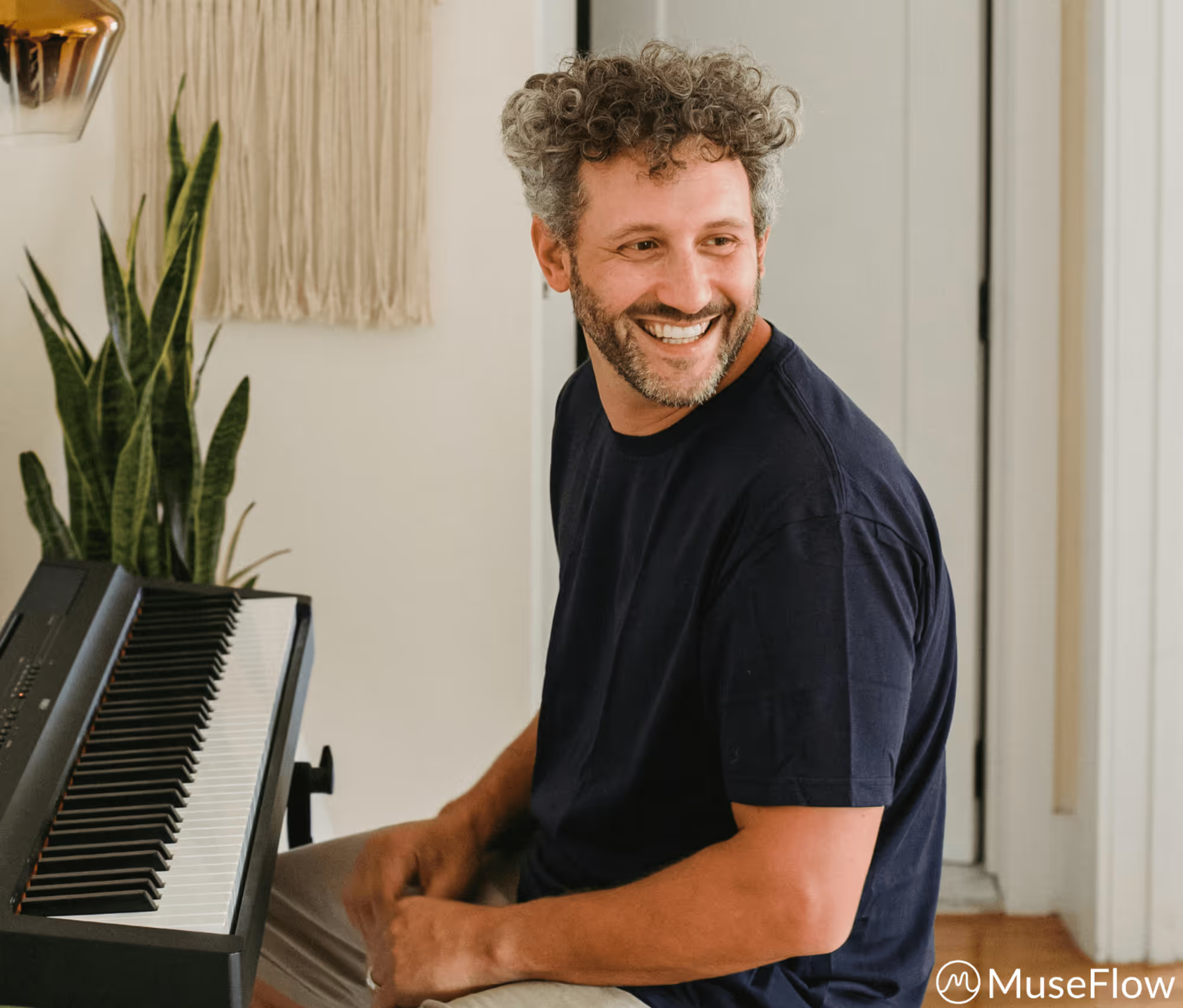
Breaking Through Plateaus: Students’ Piano App Success Stories
One of the standout features of MuseFlow is its unique piano app, using gamification to keep students engaged and striving for more. Dave admitted he was hooked:
“The gamified approach to learning is brilliant, I'm addicted! The app provides instant feedback.”
Similarly, Kalan was motivated by the visual roadmap of progress:
“I want to beat every level so that all the dots turn green.”
Even those who’ve struggled with consistency in the past, like Dennis, found themselves pushing forward:
“Any success I achieve is its own reward. Just having moved to the next higher level, I feel good and surprised that it went so quickly.”
By turning learning into a rewarding experience, MuseFlow keeps students coming back, ensuring their growth over time.

An Intuitive and Seamless Learning Experience: Our Piano Education App Reviews Are In!
Unlike traditional sight reading books or rigid lesson plans, MuseFlow’s interface is designed for smooth, distraction-free learning. Artur compared it to conventional methods and found it superior:
“When compared to traditional methods such as the ‘Improve Your Sight Reading’ book by Paul Harris, which is quite good by the way, your app's interactive way of working and real-time, immediate feedback simply outperforms traditional methods.”
Brandon also appreciated how well the app’s design supports learning:
“The endlessly generated tracks to play along with is a very great design idea.”
When the technology works effortlessly, students can focus entirely on the music. Andre summed it up simply:
“It's a genius idea and great execution. As far as I'm concerned, it’s the best in its class.”
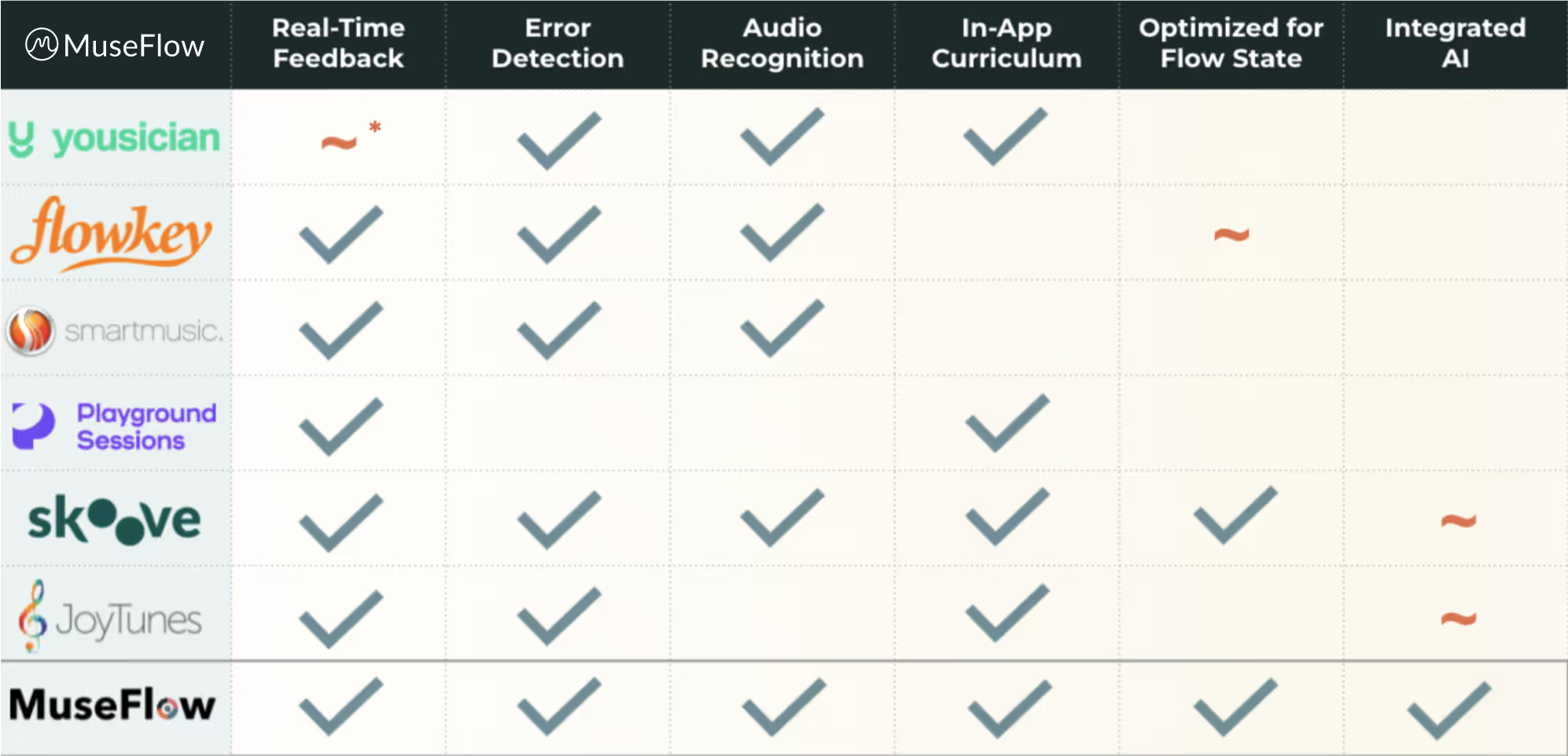
The MuseFlow Effect: Confidence, Skill, and a New Perspective
Perhaps the most inspiring part of these piano learning success stories is how MuseFlow doesn’t just improve piano skills.. it builds confidence and true fluency. For Kyle, it helped erase the self-doubt he carried for years:
“My poor sight reading has been the thorn in my side, the concrete piece of evidence that gives my insecurities justification for screaming that I am not good. And MF is directly training that skill, washing away the remnants of what my insecurities are trying to latch onto. I feel empowered!”
From beginners to seasoned musicians, MuseFlow provides a structured, intuitive, and motivating way to learn. Whether it’s building confidence, overcoming sight reading struggles, or just finding joy in the process, these students prove that mastering piano with an app is possible with the right tools.

Looking for your own piano app with incredible testimonials that provides results? MuseFlow is helping students master piano with their unique music education app like never before. Whether you’re a beginner or looking to refine your sight reading skills, this piano app truly gives students the success they need, and delivers true joy in the process of progressing to proficiency.
Are you ready to start your own success story? Try MuseFlow today and experience the difference for yourself.

How Much Does MuseFlow Cost?
Learning sight reading has come a long way in the past year. If you’re still using older methods, you’re missing out—not only on the enjoyment of learning with cutting-edge techniques, but also on your earning potential as a musician. Here’s a way to understand it.
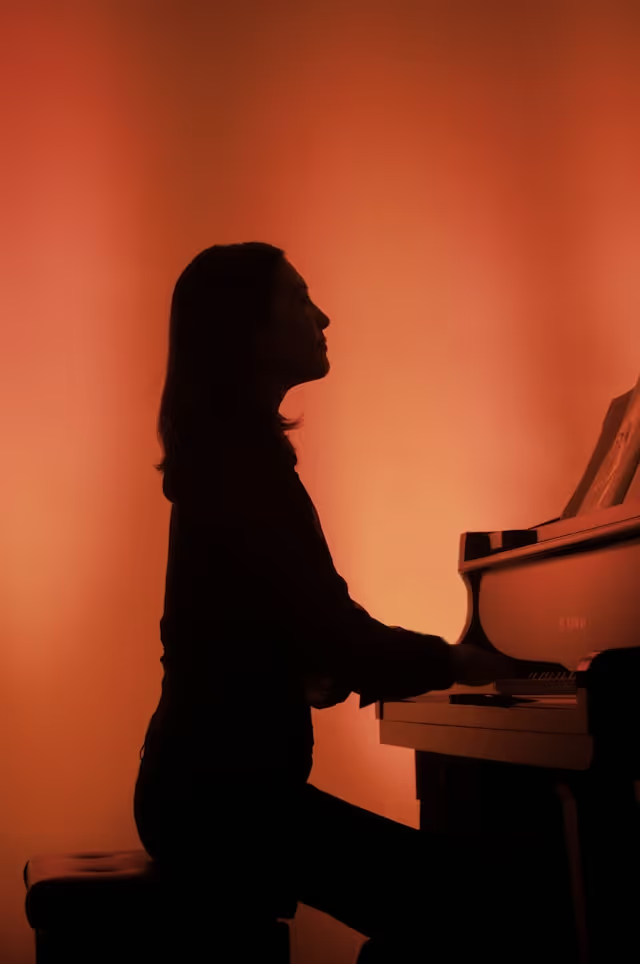
The Ancient Way of Learning Sight Reading for Piano
You buy a series of sight reading books. You’re stuck following static exercises, with no way to know if you’re truly improving or if you’re even practicing correctly. Once you finish the book, you need another—and then another. The time commitment is high, much of it wasted on inefficient exercises, with no real-time feedback to tell you whether you’re playing the notes correctly.
The result? Frustration. Progress feels slow, and the vast majority of learners quit before reaching proficiency.
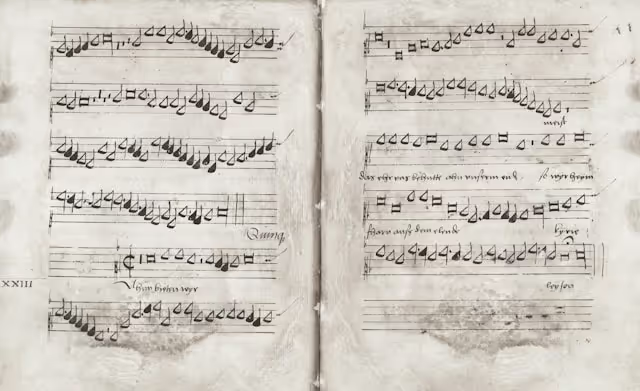
The Old Way to Learn to Sight Read Piano Music
This is just an evolution of the Ancient Way—it’s more of the same. Along with sight reading books, you have access to websites with downloadable pages or apps featuring more static music. But ultimately, it’s still just a library of music.
Sure, online tools and mobile apps provide more material, but the burden is on you to figure out:
- Which pieces fit your skill level.
- Whether you’re playing them correctly.
- How to improve.
Even if you’re willing to pay for an app, you still need to sift through an overwhelming amount of material in a song library and curate a plan yourself. That mental overhead doesn’t go toward practicing sight reading—it’s spent assembling your tools.
And let’s not forget: You can only sight read a piece once. After the first play-through, your brain starts to memorize the music, and it’s no longer sight reading.
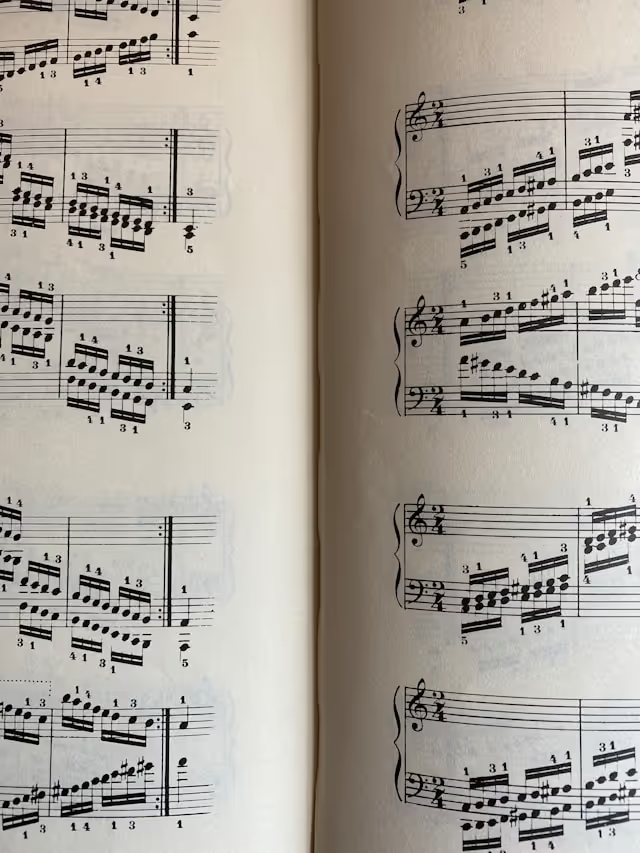
MuseFlow
Thankfully, cutting-edge technology makes the Ancient Way and Old Way obsolete. With MuseFlow, you no longer need to waste time curating materials or wondering if you’re improving.
MuseFlow is radically different.
- It doesn’t just give you more; it gives you exactly what you need to progress.
- Measures of music are created on-the-fly, tailored to your current skill level.
- Real-time feedback ensures you know whether you’re playing correctly and guides you toward mastery.
The unique value proposition of MuseFlow is that it offers infinite, dynamically generated music, precisely targeted to help you improve. MuseFlow is your personalized coach, tracking your progress and adapting dynamically to your needs.
With MuseFlow, progress is:
- Efficient: Tailored exercises keep you moving forward.
- Engaging: Real-time feedback and Flow makes learning enjoyable.
- Measurable: You see improvement every session.
MuseFlow is completely different. MuseFlow just doesn’t give you more, but gives you the precise sequence of notes you need to make progress. Measures of music are being created on-the-fly according to your skill level. There’s no system that even comes close.
The unique value proposition of MuseFlow is not that you have "more" but that you have "infinite" AND that infinite amount of music is presented in real-time, in the context of mastering the skill.
MuseFlow is your personalized coach, delivering tailored exercises, tracking your progress, and adapting dynamically to your skill level. With real-time feedback, you know exactly how to improve, and every session brings you closer to mastery.
MuseFlow is radically efficient compared to other learning methods–You’re in the Flow! Progress is fast, engaging, and measurable.
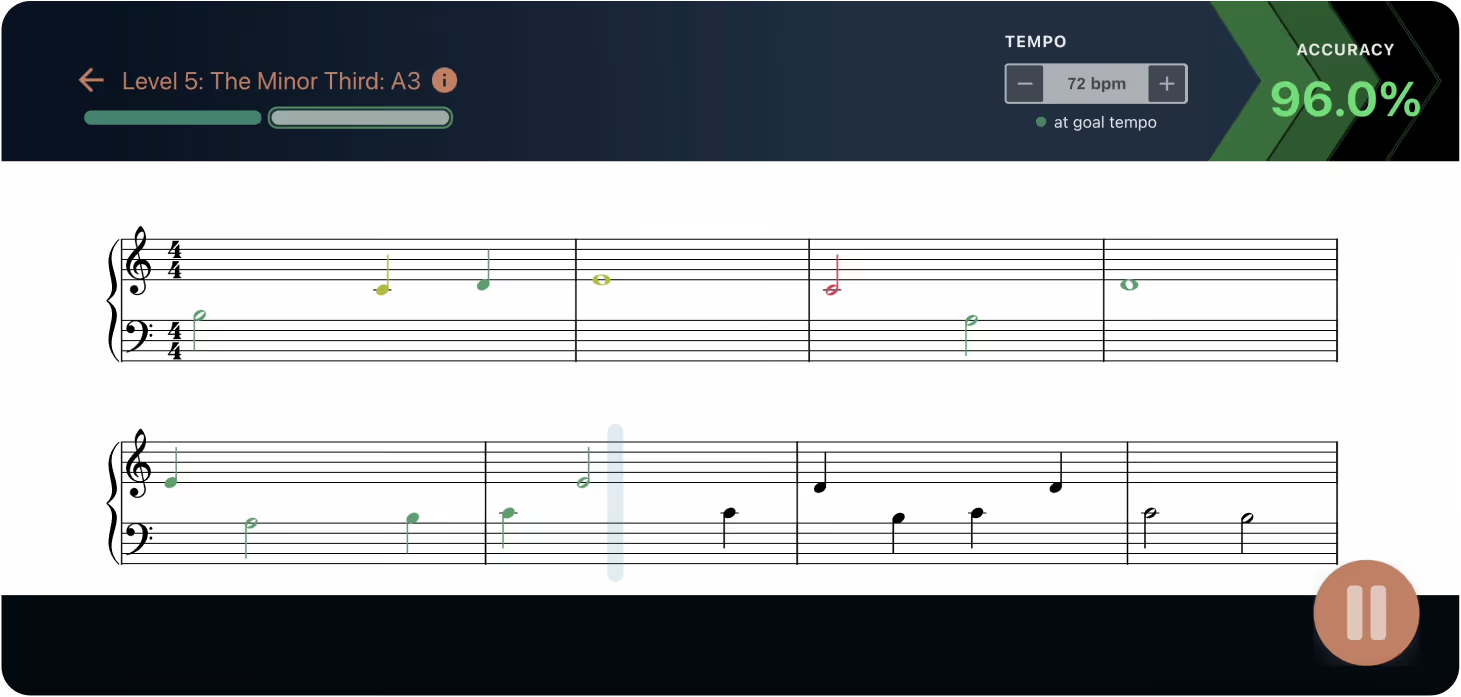
Does MuseFlow Really Cost More?
Imagine three intermediate pianists in the same city—Sally, Sam, and Sarah—all competing for the same high-paying piano gigs. They share the same goal: to reach advanced sight reading proficiency and start earning from weddings, events, and restaurants.
Their chosen learning methods, however, set them on very different paths.
- Sally chose MuseFlow: Reaches advanced proficiency in just 1 year.
- Sam used the Old Way: Takes 2 years, delayed by inefficient trial-and-error methods.
- Sarah relied on the Ancient Way: Also requires 2 years, hindered by static resources and lack of feedback.
Sally’s faster progress gave her a critical advantage. By Year 1, she was already booking gigs, gaining experience, and building demand. Meanwhile, Sam and Sarah were still learning.
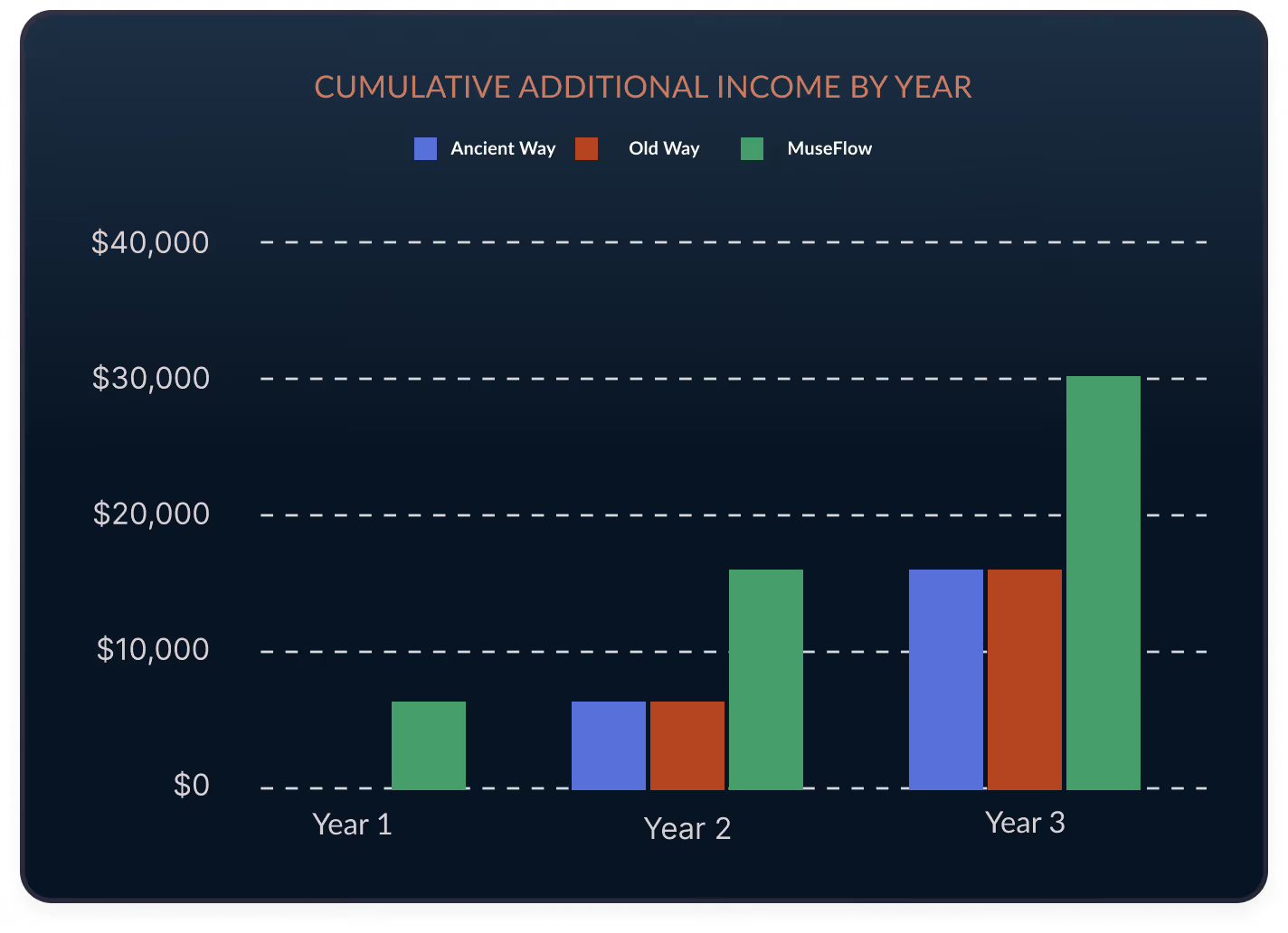
Sally’s faster proficiency gave her a head start. Starting Year 1, she was already booking gigs, gaining experience, and building demand. Sam and Sarah, meanwhile, were still learning, assuming they had even continued in their strategies (more on that later).
As a result, Sally consistently earned more across the three years, with increasing rates and more gigs over time. The cumulative effect of Sally’s early start is undeniable. By Year 3, she has out-earned both Sam and Sarah by a wide margin.
Why MuseFlow’s Return on Investment Pays off for Pianists
- Faster Proficiency: Sally reaches advanced proficiency in just one year, while Sam and Sarah lag behind. This early advantage means she books gigs sooner and accumulates more experience.
- Higher Demand and Rates: By Year 3, Sally has more gigs per month and can charge higher rates due to her growing reputation and expertise.
Sally’s choice to use MuseFlow didn’t just save her time—it accelerated her earning potential, giving her a distinct edge in the competitive gig market. With MuseFlow, she didn’t waste hours on inefficient methods or outdated tools. Instead, she focused on building her skills quickly and effectively, positioning herself for long-term success.
For example, if Sally plays at several gigs throughout the year, she will have earned $6,000 by the time Sam and Sarah are just getting started. She is more than a break-even point on her first gig where she gets to showcase her new-found sight reading proficiency. Sally can reinvest in her skills, gain more experience, and build her reputation faster. By the time Sam and Sarah reach proficiency, Sally is already well-established. MuseFlow enables learners to break even on their investment significantly faster. Look how the three of them compare for that first year.
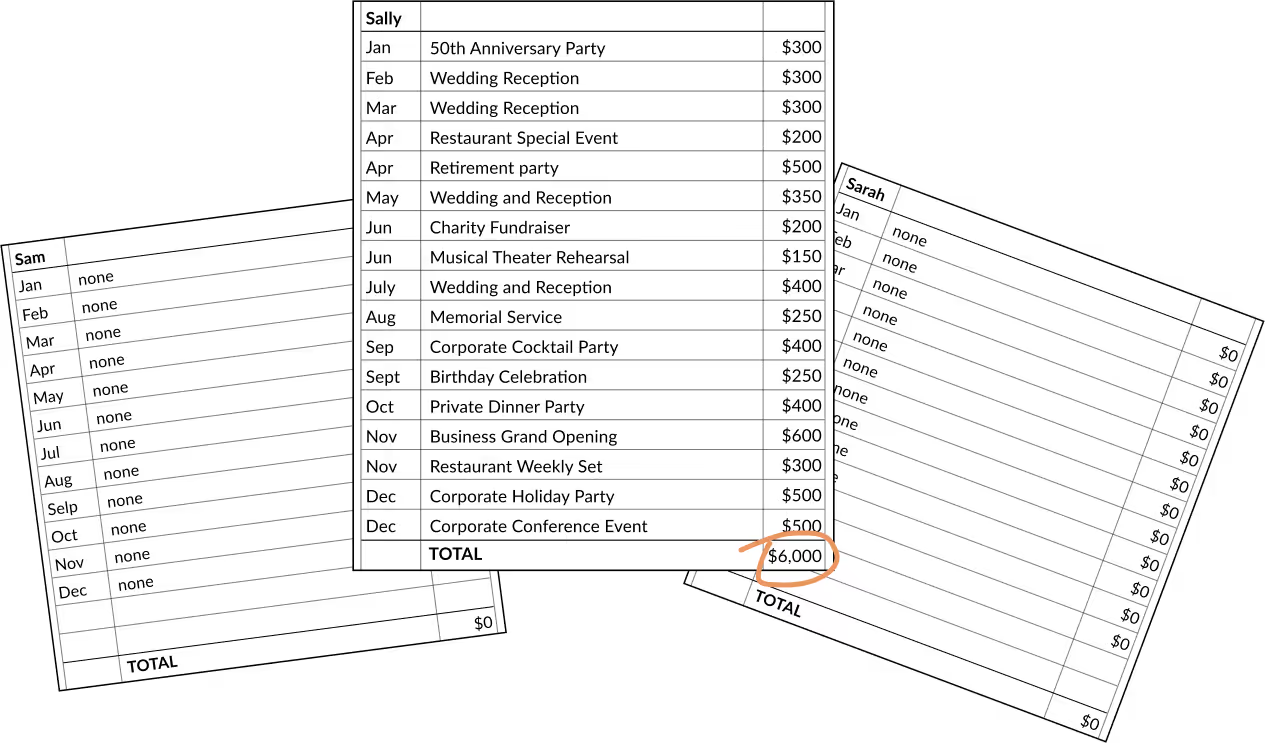
MuseFlow and Other Sight Reading Tools: Cost and Effectiveness Comparison
But Sally’s competitive advantage doesn’t stop there.
Sally, Sam, and Sarah aren’t even close to equal footing when it comes to their ability or enjoyment of learning. Why? The likelihood for Sam or Sarah to actually complete all the coursework in the Ancient Way or the Old Way is highly unlikely.
Because of how MuseFlow harnesses our human desire to learn and be in Flow state, Sally is highly likely to actually achieve mastery. Her likelihood for success actually skyrockets.
Sam and Sarah have to select, purchase, and then curate their own path forward to learning by choosing from a myriad of exercise books and websites. Simply search for “sight reading books” and you’ll discover what variety is out there for all sorts of instruments, age levels, and interests.
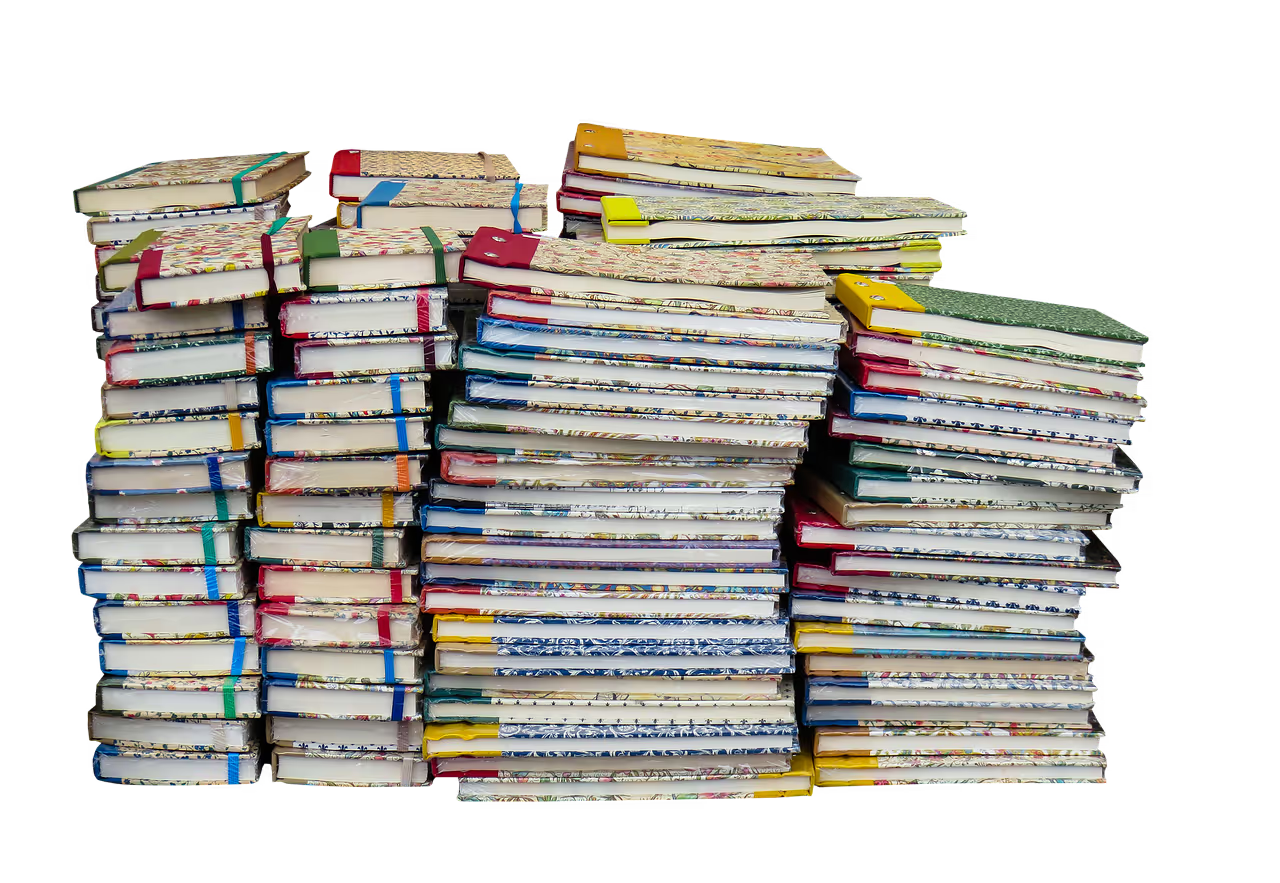
Once Sam and Sarah have the books, apps, videos, or Internet resources, then they need to learn the particular system for each and then slog through them.
They will be the musician and judge simultaneously to determine if they are ready to proceed to the next exercise or book. They have zero feedback to know if they’re playing the exercises correctly.
In all likelihood, despite Sam and Sarah’s good intentions, most of their sight reading exercise books and online resources will go untouched. They will simply join the statistics of so many who do not increase their sight reading proficiency.
On the other hand, Sally opens her laptop with her digital keyboard, and the EXACT music she needs to learn sight reading is given to her. Down to the musical measure, it’s precise for her skillset. Even more than that, she has a built-in coach telling her how she’s doing. She can’t proceed until she’s mastered it.

This type of learning is incredibly motivating for Sarah. She’s in the flow. As a result, not only is Sarah learning more efficiently, but she’s far more likely to reach her goal compared to others using traditional methods.
Is MuseFlow Worth It? Comparing Costs and Results
Here is a comparison of sight reading resources available on the market. The bar chart represents the financial investment to purchase the resources. The line represents the likelihood to actually use the resources to learn to sight read.

Note that while MuseFlow requires more of an investment, the likelihood of actually fully using MuseFlow approaches 100%. The other methods may require less of a financial investment, but that also means there’s less of a likelihood to actually use them to learn how to sight read.
With the goal of increasing proficiency in sight reading, MuseFlow gives Sarah everything she needs to succeed:
- Precision: Exercises tailored to her skill level, ensuring she masters each technique before moving on.
- Efficiency: Instead of wasting time on irrelevant or repetitive drills, Sarah focuses on playing and improving.
- Interactivity: Real-time feedback keeps her motivated, engaged, and always moving forward.
- Positive Feedback Cycle: Progress in learning builds upon itself to create further improvements and outcomes.
MuseFlow doesn’t just give Sarah more of what she may–or may not–need to progress in her learning. MuseFlow delivers exactly the right amount of content, in the right context, so she masters every skill before progressing. Here’s where all this comes together.
Is MuseFlow Worth Expense to Learn Sight Reading for Piano?
While MuseFlow might look “more expensive,” the advanced Flow state learning technique gives Sarah a much higher likelihood of success than the alternatives. Put another way, she is getting more value for her dollar. Why? Because Inexpensive-but-Incomplete is actually more costly than Expensive-and-Complete.
A common way to express this is an Efficiency Ratio. This calculation measures how much value you receive for every dollar you spend (Likelihood ÷ Cost).
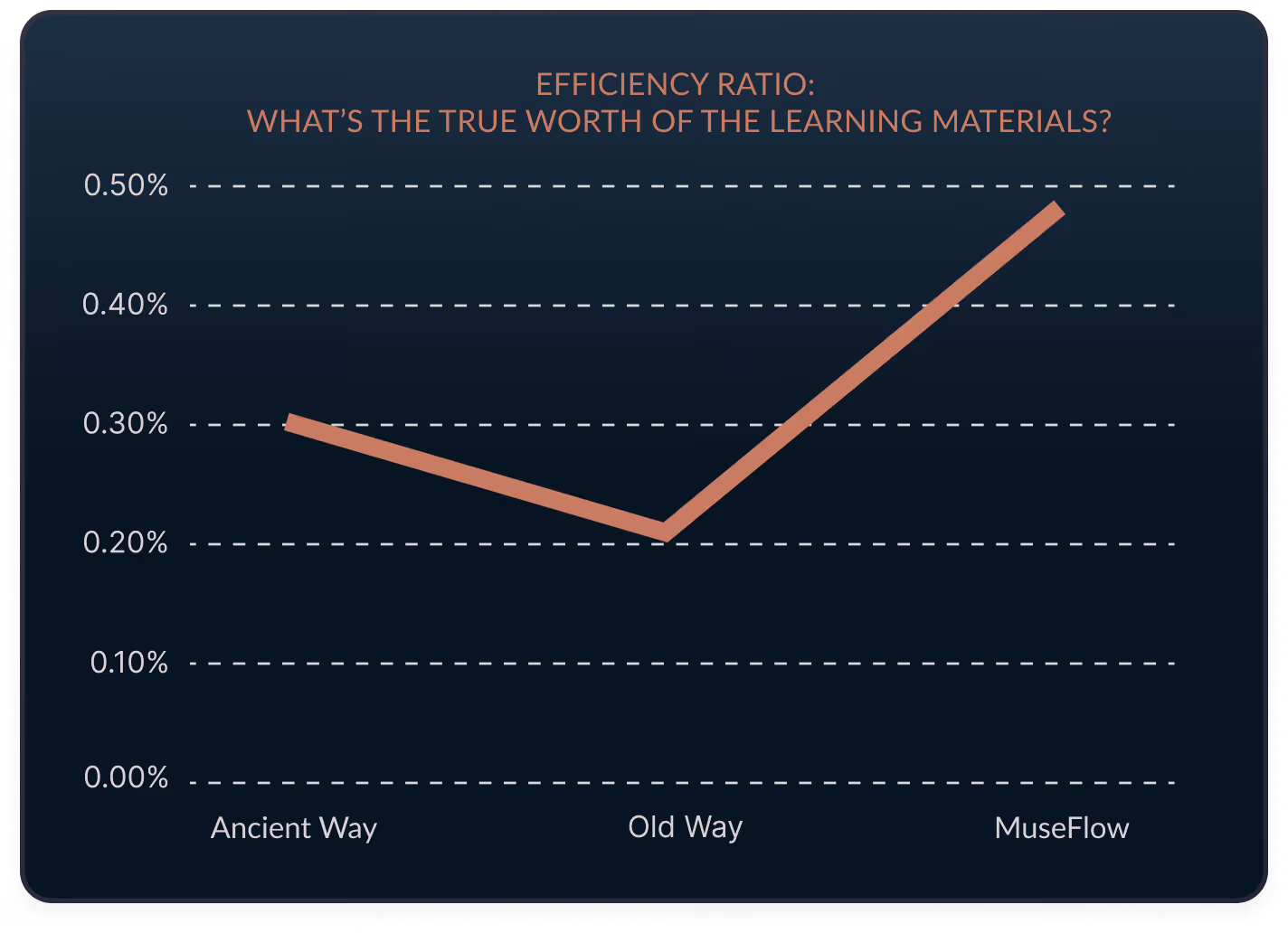
What good does it do Sally if she saves a few dollars by purchasing a variety of exercise books, music library apps and other resources, yet never uses them? Sally is committed to improving her skillset, enriching her musicianship, and increasing her income. Wouldn’t she want the best resources and strategy to achieve that goal?
What Piano Players Get with MuseFlow
To explain this differently, let’s fast forward a few months with Sam, Sarah, and Sally.
After frustration of plodding haphazardly through exercises, Sarah has become weary. She’s starting to tell herself things like: “Learning to sight read is too hard…. Maybe I’ll try later.” Her dreams of being paid to play piano at weddings and events is starting to fade. She’s got a despondent look on her face.
Sam is facing a similar discouraging story. He’s spent an inordinate amount of time and effort to research and purchase various exercise books and music library apps. He’s probably spent more time cobbling together a system than he has actually learning how to sight read. It’s been over a week since he’s touched his piano, and he’s starting to rationalize: “Eh, I play good enough…”
If Sam and Sarah were to actually continue, they will have experienced “hidden costs” in inefficiency—time spent curating resources or stalled progress due to lack of motivation. This translates to wasted energy and opportunity costs for earning income. Also, they will not have enjoyed the sight reading learning process nearly as much as Sally.
Sally chose MuseFlow and wears a concentrated smile each time she plays. She is in Flow state within minutes. No guesswork or inefficiencies as to where to begin or where to focus her attention. She will play exercises precisely tailored to her skill level. As she plays, she will experience real-time feedback that keeps her in the Flow–motivated, engaged, and always progressing. That ever-increasing momentum builds a positive feedback cycle where each measure she plays builds to improve her outcomes.
Ready to be like Sally and unlock your full potential? Start with MuseFlow and begin your sight reading journey. Start learning, enjoying, and earning faster than you ever thought possible.

What Music Learners Really Want - and How MuseFlow Delivers
When learning to sight read music, frustrations can easily derail progress. We know that mastering this skill is challenging enough without running into roadblocks caused by the tools themselves. That’s why MuseFlow was created: to address the biggest challenges music learners face and offer a superior learning experience.
To illustrate, we’ve gathered some anonymized, recent reviews from other systems for sight reading—both books and online. These reviews reflect real frustrations learners have encountered—and highlight how MuseFlow solves these issues.
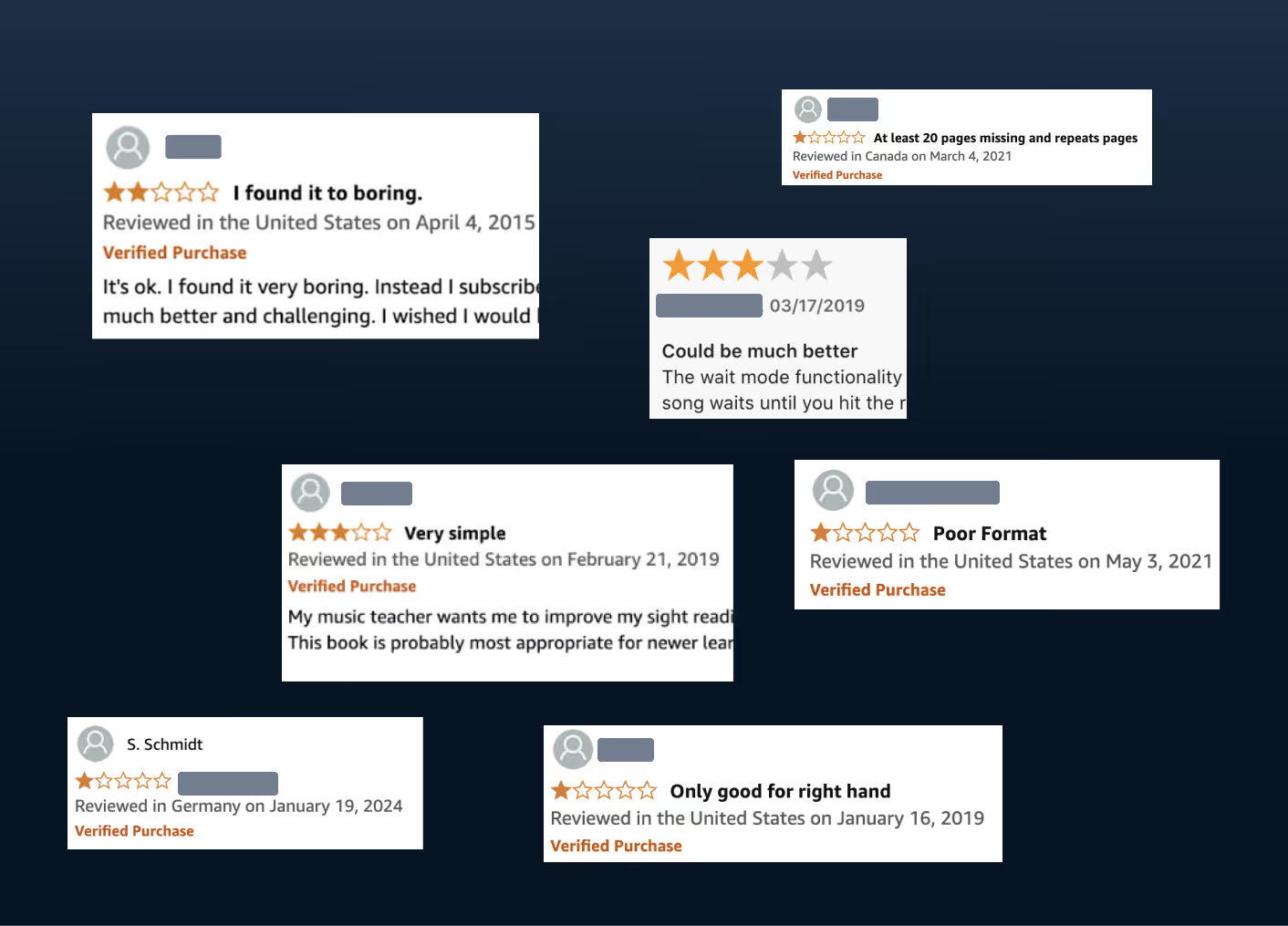
Real Reviews of Products VS How MuseFlow Delivers
Product A
“I just wish there were a few more things they added in, like actually listening to the piano to check if notes/rhythm right and if the answer is wrong, revealing the right answer.”
MuseFlow
By connecting to a digital piano, MuseFlow provides precise, real-time feedback on both notes and rhythm. You’ll always know whether you’re playing correctly, and you’ll receive instant corrections to improve faster.
Product B
“The inability for it to properly recognize notes is frustrating and interrupts flow and learning.”
MuseFlow
This is exactly what MuseFlow doesn’t do. With advanced AI, MuseFlow seamlessly recognizes the notes you play and keeps you in a flow state... free from interruptions or misreads.
Product C
“It has a hard time picking up certain notes. This severely disrupts my flow during a song when I have to repeat a key until it finally recognizes, or it randomly skips notes sometimes.”
MuseFlow
MuseFlow is built to prioritize uninterrupted learning. With its accurate note recognition and adaptive technology, you’ll never have to stop mid-song to troubleshoot. MuseFlow ensures your learning experience stays smooth and engaging.
Product D
“I found it very boring.”
MuseFlow
With MuseFlow, boredom is a thing of the past. Its dynamic, real-time generated exercises keep you continuously engaged. You’re always in flow state—not too bored, not too overwhelmed—right in that pocket of the goldilocks zone, just perfectly challenged to keep progressing.
Product E
“My music teacher wants me to improve my sight reading and recommended this book. I found it rather simple. My teacher thinks I have picked up my skill, butI'm not convinced….I'd like to find something a bit more challenging.”
MuseFlow
MuseFlow ensures every exercise is tailored to your skill level. You’ll never feel under-challenged or stuck with static materials. The app’s adaptive AI grows with you, ensuring that your learning remains engaging and appropriately difficult. The piano learning software makes sure everyone is on their own SUCCESSFUL journey.
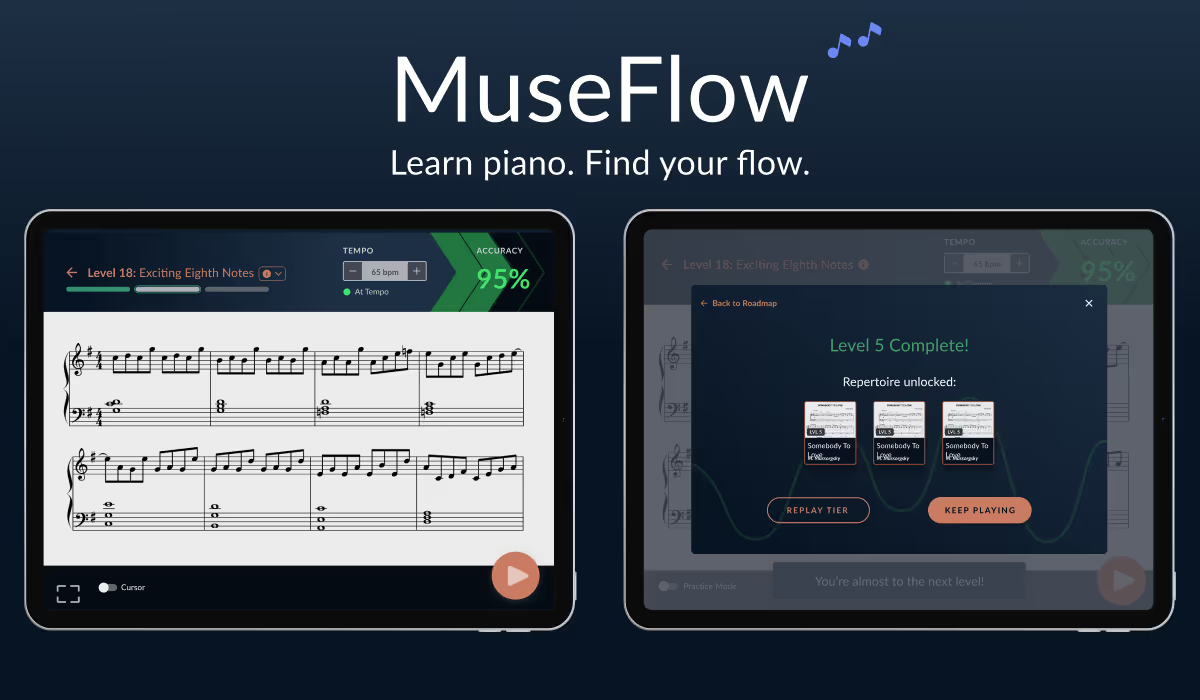
Why MuseFlow is the Better Choice
Learning sight reading should be a fulfilling journey... not a frustrating one. MuseFlow’s cutting-edge technology solves the issues that have plagued music learners for years:
- Accurate Feedback: Know exactly how you’re performing and what to improve.
- Uninterrupted Learning: Stay in the Flow State with precise note recognition.
- Dynamic Content: Progress with real-time generated music tailored to your needs.
- Engagement: Never too boring, never too hard—just the right level of challenge.
With MuseFlow, you’ll move beyond outdated tools and experience a revolutionary way to master sight reading.

Giving the Gift of Sight Reading: Make MuseFlow Your Holiday Gift this Season
This holiday season, give a gift that goes beyond the ordinary; a gift that opens up the world of learning piano music. MuseFlow isn’t just any music learning app; it’s a gateway to mastering the skill of sight reading - the act of reading music at first sight - making music performance more accessible, meaningful, and enjoyable. Here’s why MuseFlow is the perfect gift for those looking to excel in piano performance, find personal fulfillment, and spread joy through music.

1. For Performers Who Want a Competitive Edge
For those who perform, music isn’t just a passion… it’s a way to connect, impress, and earn some extra cash. Imagine walking into any gig, ready and able to play any popular songs on the spot. People throw you request after request, you pull them up on your iPad with Ultimate Guitar or MuseScore, and you just go! MuseFlow gives performers the confidence to do just that, offering a seamless, personalized curriculum that strengthens sight reading skills, enabling users to read and adapt to playing never before seen music quickly.
MuseFlow’s real-time feedback, and adaptive sight reading levels are designed to boost not only proficiency but also versatility. This isn’t about memorizing a few songs; it’s about mastering the skills that let performers meet any song request with ease, broadening their repertoire quickly and enjoyably. Think about how much more you could earn in gigs with even a 20% improvement in sight reading! MuseFlow is the tool that lets you take that leap with ease.

2. The Gift of Lifelong Music Mastery
For those juggling family, work, and personal time, music often serves as a cherished retreat. MuseFlow’s unique, adaptable approach brings the joy of learning piano into even the busiest lifestyle. With the flexibility to practice anywhere, at any time, for any duration, and a curriculum that meets users where they are, MuseFlow empowers them to progress steadily and enjoyably, making every practice session a moment of personal enrichment.
Imagine being able to sight read and enjoy playing any piece of sheet music that comes your way, whether it’s for a family gathering, a community event, or a peaceful evening at home. MuseFlow is more than a tool… it’s an opportunity to deepen musical skills, and to share that passion with loved ones, whether through playing together or inspiring the next generation to love music.

3. The Perfect Holiday Gift for Music Lovers
MuseFlow is the ideal gift for anyone who has a love for music, whether they’re performers looking to build their skillset, or enthusiasts seeking personal fulfillment. It’s a thoughtful way to show someone that you believe in their potential, that you’re investing in their joy, and that music can be part of their life in a meaningful way.
With flexible subscription plans and bundles, MuseFlow is easy to give and even easier to love. This season, give the gift that resonates long after the holidays… a gift that brings music to life, one note at a time.


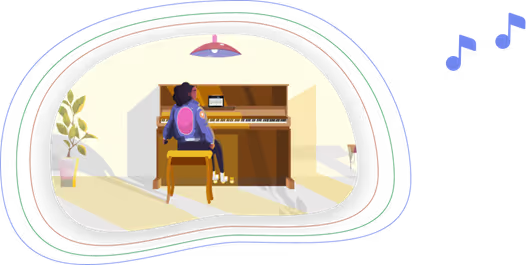
Try MuseFlow for Free!
Keep up to date on our progress as we continue to add new features!
